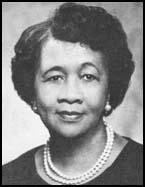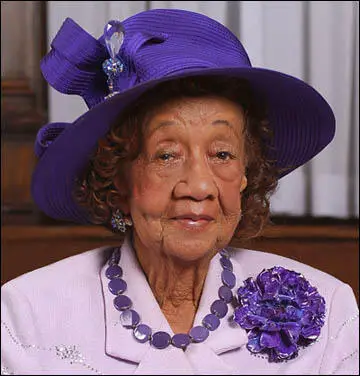Dorothy Height

Dorothy Height was born in Richmond, Virginia, on 24th March 1912. Her father, who was a builder, moved the family to Rankin, Pennsylvania, hoping to find a more racially tolerant environment.
Height won an essay contest, which brought the prize of a scholarship to Barnard College in New York City. However, when she arrived in 1929 she was excluded because of her race. She later recalled in Open Wide the Freedom Gates: "Although I had been accepted, they could not admit me. It took me a while to realize that their decision was a racial matter: Barnard had a quota of two Negro students per year, and two others had already taken the spots." Height went instead to New York University where she did an undergraduate and a master's degree in educational psychology.
After leaving university she became a welfare case-worker in Harlem. During this period she became friends with Langston Hughes and Mary McLeod Bethune. According to Godfrey Hodgson: "Whenever there was a lynching in the south, she and a group of friends would demonstrate in Times Square, wearing black armbands."
In 1944 Dorothy Height joined the national staff of the Young Women's Christian Association. Soon afterwards she met Martin Luther King while in Atlanta, Georgia. Although he was only a teenager it was the beginning of a long relationship.
In 1957 Height became director of the National Council of Negro Women. In the same year Martin Luther King joined with the Reverend Ralph David Abernathy and Bayard Rustin to form the Southern Christian Leadership Conference (SCLC). The new organisation was committed to using nonviolence in the struggle for civil rights, and SCLC adopted the motto: "Not one hair of one head of one person should be harmed." Over the next few years Height worked closely with King in his various campaigns and eventually became chair of the executive committee of the Leadership Conference On Civil Rights, the umbrella organisation for the civil rights movement.
During the 1960 presidential election campaign John F. Kennedy argued for a new Civil Rights Act. After the election it was discovered that over 70 per cent of the African American vote went to Kennedy. However, during the first two years of his presidency, Kennedy failed to put forward his promised legislation.
Height took part in the March on Washington for Jobs and Freedom on 28th August, 1963, was a great success. Estimates on the size of the crowd varied from between 250,000 to 400,000. Speakers included Martin Luther King (SCLC), Philip Randolph (AFL-CIO), Floyd McKissick (CORE), John Lewis (SNCC), Roy Wilkins (NAACP), Witney Young (National Urban League) and Walter Reuther (AFL-CIO). King was the final speaker and made his famous I Have a Dream speech.
When Martin Luther King was killed on 4th April 1968, Height went to the White House and advised President Lyndon Johnson on how to minimize black protests and rioting.

In 1994 President Bill Clinton gave her the presidential medal of freedom. She retired as director of the National Council of Negro Women in 1997. She remained chairman of the group. Height commented: I hope not to work this hard all the rest of my life, but whether it is the council, whether it is somewhere else, for the rest of my life, I will be working for equality, for justice, to eliminate racism, to build a better life for our families and our children."
Dorothy Height died at Howard University Hospital on 20th April 2010.
Primary Sources
(1) Time Magazine (20th April, 2010)
Dorothy Height, who as longtime president of the National Council of Negro Women was the leading female voice of the 1960s civil rights movement, died Tuesday. She was 98.
Height, who continued actively speaking out into her 90s, had been at Howard University Hospital for some time.
As a teenager, Height marched in New York's Times Square shouting, "Stop the lynching." In the 1950s and 1960s, she was the leading woman helping the Rev. Martin Luther King Jr. and other leading activists orchestrate the civil rights movement.
The late activist C. DeLores Tucker once called Height an icon to all African-American women.
"I call Rosa Parks the mother of the civil rights movement," Tucker said in 1997. "Dorothy Height is the queen."
Height was on the platform at the Lincoln Memorial, sitting only a few feet from King when he gave his famous "I have a dream" speech at the March on Washington in 1963.
"He spoke longer than he was supposed to speak," Height recalled in a 1997 Associated Press interview. But after he was done, it was clear King's speech would echo for generations, she said, "because it gripped everybody."
Height became president of the National Council of Negro Women in 1957 and held the post until 1997, when she was 85. She remained chairman of the group.

